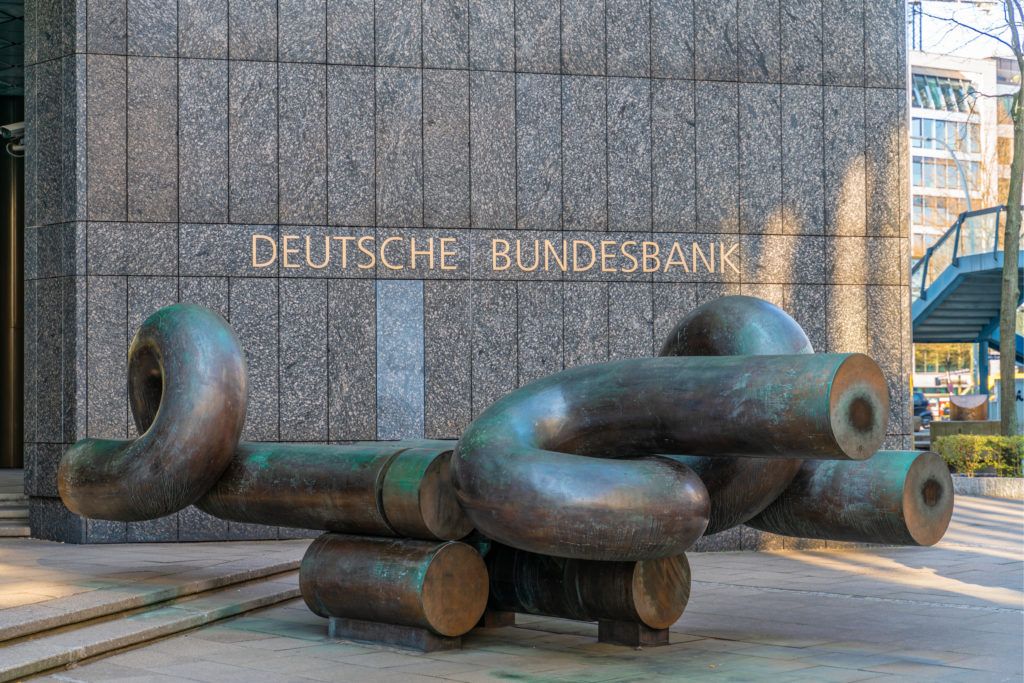The potential for blockchain technology to revolutionize the banking industry has been hotly debated. Devotees suggest that the technological basis for Bitcoin is the next big thing, but others — like Bundesbank — are more skeptical.
The president of Bundesbank, Germany’s central bank, has stated that a trial project utilizing the nascent technology to settle transactions is slower and more expensive than legacy solutions. The experiment, which it began in 2016 with Deutsche Boerse, appears to be a failure.

Bundesbank: Blockchain Is Not A ‘Real Breakthrough’
Bundesbank has already attempted to create its own distributed ledger system for processing transactions. While secure and effectively able to accomplish all that a traditional system can, it simply doesn’t measure up. Stated Jens Weidmann, Bundesbank president:The blockchain solutions did not fare better in every way: the process took a bit longer and resulted in relatively high computational costs. Similar experiences have been made elsewhere in the financial sector. Despite numerous tests of blockchain-based prototypes, a real breakthrough in application is missing so far.Others seem to confirm this view, indicating that blockchain is simply not fitting a niche. They suggest that, while perhaps useful, it hasn’t generated the necessary traction to be useful.
Blockchain: still a hammer looking for a nail https://t.co/2N4rcmdFpk
— Paul Krugman (@paulkrugman) May 30, 2019
Disrupting or Replacing?
Of course, many argue that the technology is still in its most basic form. The creation of Bitcoin (BTC) effectively generated an entirely new type of transaction management system and adoption has been relatively slow. Still, others argue that the issue is not integrating blockchain technology into the legacy banking system, but replacing it altogether. With fears of recession and economic collapse looming, many are pointing fingers to the central banks — like Bundesbank — as the cause. These new voices have called for a rethink in how money is managed both locally and internationally. Many argue that the costs of banking, and therefore the transaction costs related to Bitcoin, are due to centralized policies.A replacement of the legacy financial systems like Bundesbank with a decentralized option like Bitcoin could massively reduce transaction costs. Much of the checks and balances built into traditional banking models could even be replaced with distributed ledger technology in a Bitcoin utopia. Do you think Bitcoin will be a replacement to legacy financial systems or is blockchain simply too basic to really disrupt the space? Do you agree with Bundesbank? Let us know your thoughts in the comments below!Central banks have been “powerful in terms of taking volatility out of the market and pumping asset prices up" according to PIMCO.
— Pomp 🌪 (@APompliano) May 29, 2019
They can’t do that forever.
Consider this your warning to proceed with caution 🙏🏽
Top crypto projects in the US | April 2024
Trusted
Disclaimer
In adherence to the Trust Project guidelines, BeInCrypto is committed to unbiased, transparent reporting. This news article aims to provide accurate, timely information. However, readers are advised to verify facts independently and consult with a professional before making any decisions based on this content. Please note that our Terms and Conditions, Privacy Policy, and Disclaimers have been updated.

Jon Buck
With a background in science and writing, Jon's cryptophile days started in 2011 when he first heard about Bitcoin. Since then he's been learning, investing, and writing about cryptocurrencies and blockchain technology for some of the biggest publications and ICOs in the industry. After a brief stint in India, he and his family live in southern CA.
With a background in science and writing, Jon's cryptophile days started in 2011 when he first heard about Bitcoin. Since then he's been learning, investing, and writing about cryptocurrencies and blockchain technology for some of the biggest publications and ICOs in the industry. After a brief stint in India, he and his family live in southern CA.
READ FULL BIO
Sponsored
Sponsored
